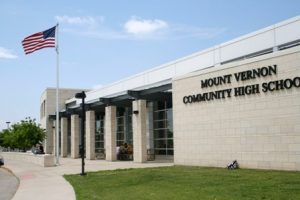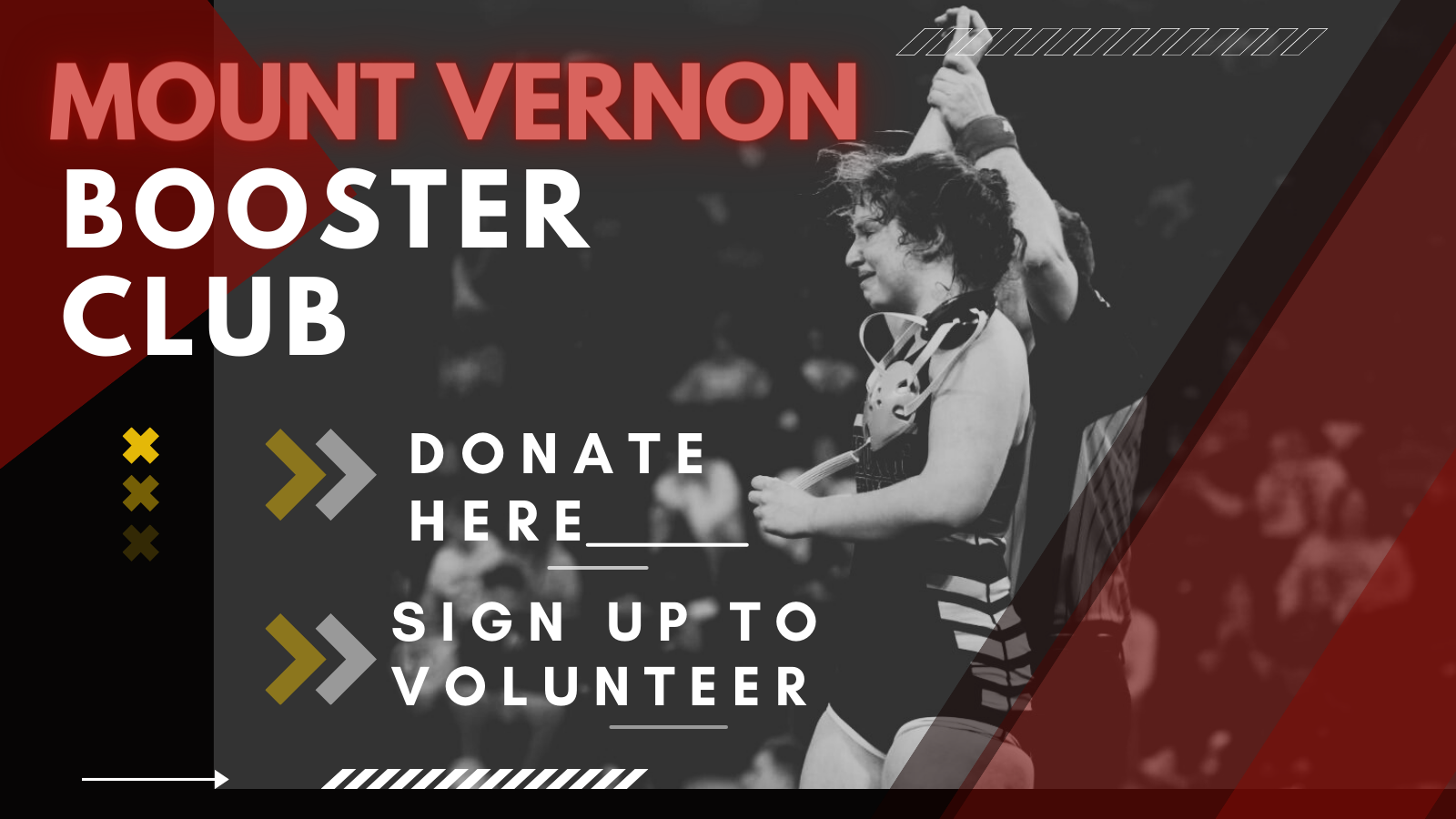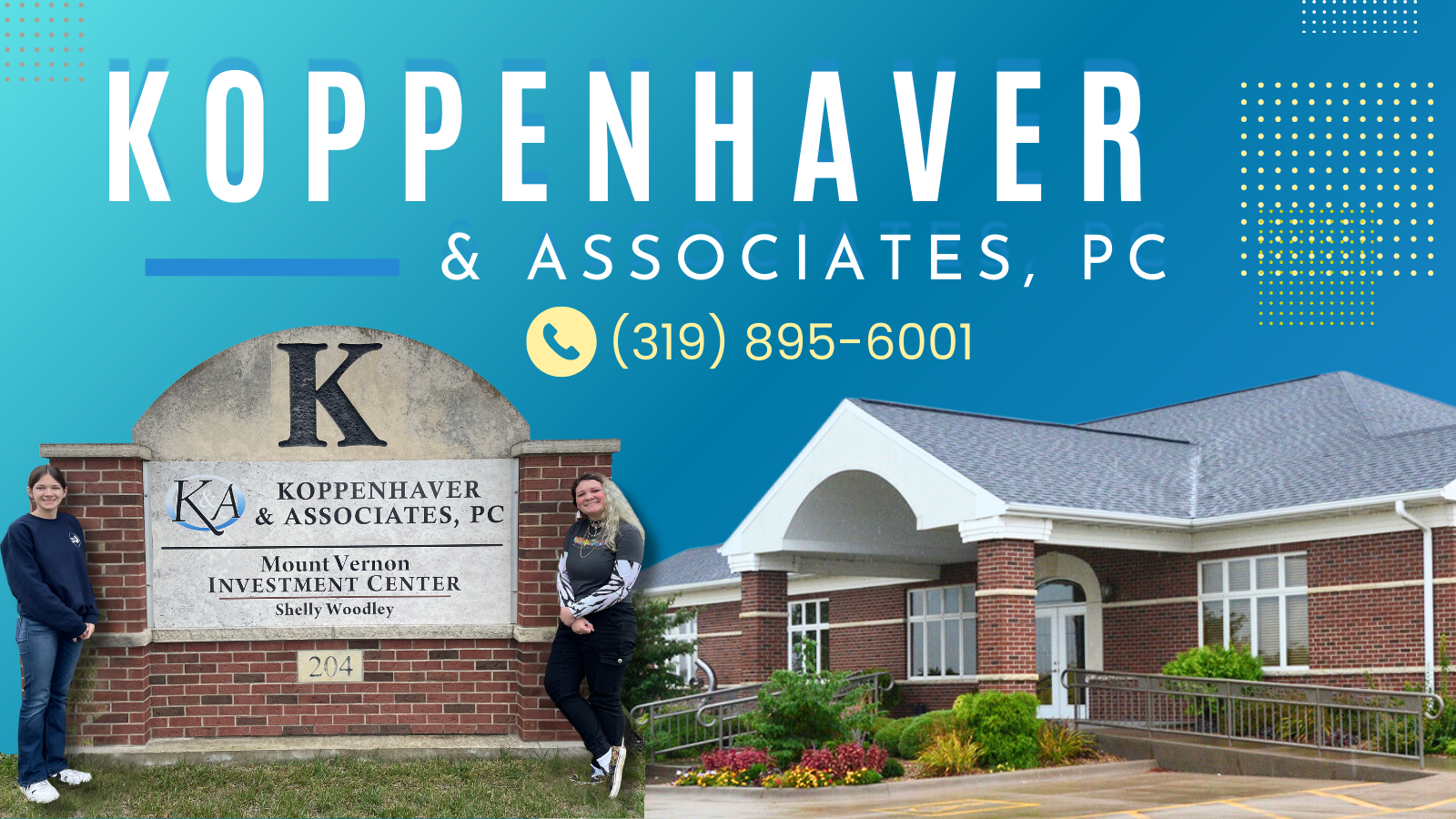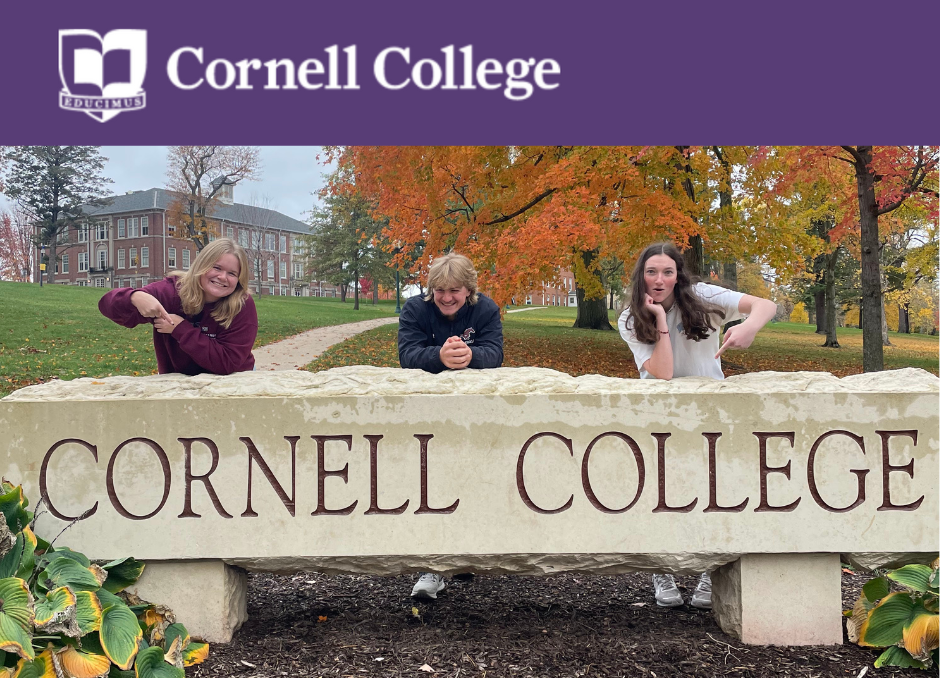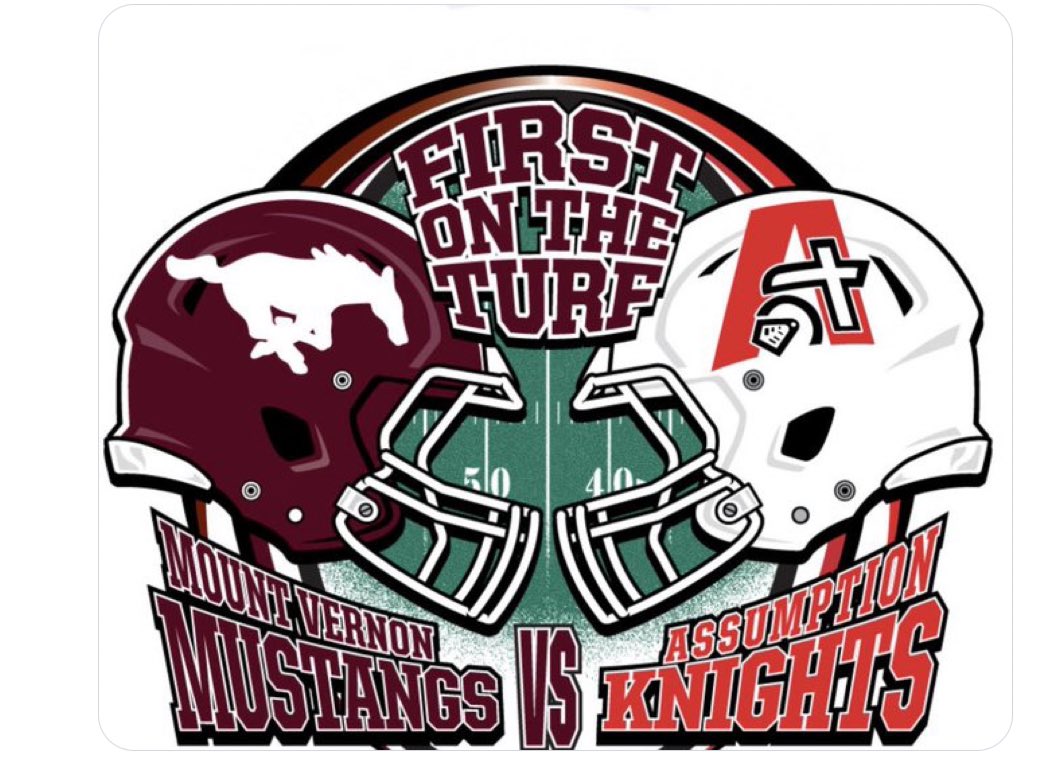Contact Us
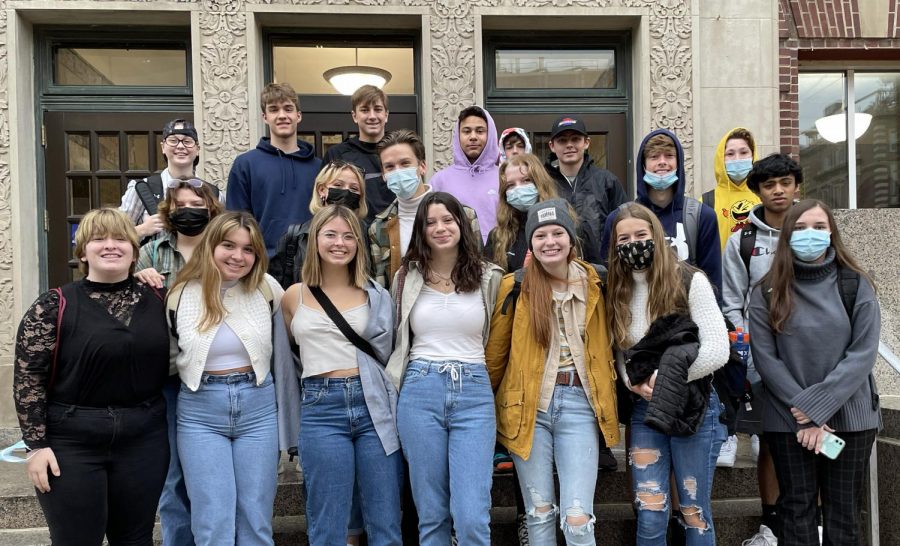
themustangmoon.com is the official website of the student journalists of Mount Vernon High School in Mount Vernon, Iowa. The Mustang Moon is a designated public forum for student expression. Student editors make all content decisions without prior review from school officials. MVHS has a population of 422 students in grades 9-12. Journalism adviser JoAnn Gage can be reached by email at [email protected] or at the school number (319) 895-8843. The 2022-2023 editor-in-chief of the website is Dallas Olberding.
Mount Vernon High School Media Editorial Policy
This editorial policy was created with the use of a template posted on the jea.org website by Aaron Manfull in July of 2011.
“Congress shall make no law…abridging the freedom of speech, or of the press….”
-The First Amendment to the Constitution of the United States of America
“The vigilant protection of constitutional freedoms is nowhere more vital than in the community of American schools.”
-Tinker v. Des Moines Independent Community School District
The Mount Vernon High School Media Editorial Policy pertains to all MVHS student media, including the website, www.TheMustangMoon.com, and the yearbook, The Centaur, and all connected social media sites.
MVHS Media are the official student-produced media of news and information published/produced by MVHS Media students. MVHS Media have been established as designated public forums for student editors to inform and educate their readers as well as for the discussion of issues of concern to their audience. It will not be reviewed or restrained by school officials prior to publication or distribution. Advisers may – and should coach and discuss content – during the writing process.
Because school officials do not engage in prior review, and the content of MVHS Media is determined by and reflects only the views of the student staff and not school officials or the school itself, its student editorial board and responsible student staff members assume complete legal and financial liability for the content of the publication.
I. FREEDOM OF THE PRESS
As it is essential to preserve the freedom of the press in order to preserve a free society,
1. The media will serve the best interest of the students and faculty of Mount Vernon High School, keeping itself free from any commercial obligations distracting from this purpose; this is defined by the media itself;
2. Any decisions affecting the publications on all levels will be made by the editorial board, the adviser is allowed to give legal advice and his/her opinion, but the final decision rests in the hands of the editorial board;
3. Only the editorial board may prevent material it judges to be in violation of the media editorial policy, from being printed;
4. All media will vigorously resist all attempts at censorship, particularly pre-publication censorship;
5. All media retain the right to publish any and all material attained through an interview by a staff member of the publications staff, holding that the interviewee was made aware that the information could be published in any form at any time;
6. All student media referenced in this editorial policy are designated public forums;
7. Student journalists may use print and electronic media to report news and information, to communicate with other students and individuals, to ask questions of and consult with experts and to gather material to meet their newsgathering and research needs;
8. MVHS Media and its staff are protected by and bound to the principles of the First Amendment and other protections and limitations afforded by the Constitution and the various laws and court decisions implementing those principles;
9. MVHS Media will not publish any material determined by student editors or the student editorial board to be unprotected, that is, material that is libelous, obscene, materially disruptive of the school process, an unwarranted invasion of privacy, a violation of copyright or a promotion of products or services unlawful (illegal) as to minors as defined by state or federal law;
10. Definitions and examples for the above instances of unprotected speech can be found in Law of the Student Press published by the Student Press Law Center.
II. THE EDITORIAL BOARD
1. The editorial board will consist of all student staff editors.
2. The editorial board decides on all decisions that pertain directly the MVHS media and their interests.
3. No member of the editorial board shall have more than one vote on the board.
4. All members of the editorial board and the adviser will elect a replacement for board members who have been dismissed.
5. All members of the editorial board are expected to know their duties and jobs in the room and must understand the consequences of not fulfilling said jobs.
6. The student editor and staff who want appropriate outside legal advice regarding proposed content – should seek attorneys knowledgeable in media law such as those of the Student Press Law Center. Final content decisions and responsibility shall remain with the student editorial board.
7. The duly appointed editor or co-editors shall interpret and enforce this editorial policy.
III. THE ADVISER
1. The adviser is a professional teaching staff member and is in charge of the class just as in a conventional classroom situation.
2. Is a certified journalism teacher that serves as a professional role model, motivator, catalyst for ideas and professionalism, and an educational resource.
3. Provides a journalistic, professional learning atmosphere for students by allowing them to make the decision of content for the media and ensuring the media will remain an open forum.
4. Guides the newspaper staff in accordance with approved editorial policy and aids the educational process related to producing the newspaper.
5. May caution, act as legal consultant and educator terms of unprotected speech, but has no power over censorship or veto except for constitutionally valid reasons.
6. Will keep abreast of the latest trends on journalism and share these with students.
7. Will submit the school newspaper, yearbook, and online content produced by the students to rating services and contests in order for the school publications staff to receive feedback.
8. Will forward any received correspondence and/or information to the appropriate editors.
9. Will provide information to the staff about journalism scholarships and other financial aid, and make available information and contacts concerning journalism as a career.
10. Will work with the faculty and administration to help them understand the freedoms accorded to the students and the professional goals of the school publications.
11. The adviser will not act as a censor or determine the content of the media. The adviser will offer advice and instruction, following the Code of Ethics for Advisers established by the Journalism Education Association as well as the Canons of Professional Journalism. School officials shall not fire or otherwise discipline advisers for content in student media that is determined and published by the student staff.
IV. THE BUILDING ADMINISTRATION
1. The Mount Vernon High School administration will provide the students of MVHS with a qualified journalism instructor to serve as a professional role model, adequate classroom equipment, and space for a sound journalism program.
2. MVHS administration will offer equal opportunity to minority and/or marginalized students to participate in journalism programs.
3. MVHS administration is not required to view and approve publication content before publishing.
V. CONTENT OF MVHS MEDIA
A. INTRODUCTION
All content decisions will be made in occurrence to the following provisions, while keeping in mind that the overall purpose, role and goal of all MVHS Media is to
1. Inform, interpret, and entertain their viewers through accurate and factual reports, where information has been thoroughly gathered and information has been completely verified;
2. Serve as an educational laboratory experience for those on staff;
3. Be accurate, fair, and impartial in its coverage of issues that affect the school community;
4. MVHS Media will not avoid publishing a story solely on the basis of possible dissent or controversy;
5. Cover the total school population as effectively and accurately as possible;
6. The staff of MVHS Media will strive to report all issues in a legal, objective, accurate and ethical manner, according to the Canons of Professional Journalism developed by the Society for Professional Journalists. The Canons of Professional Journalism include a code of ethics concerning accuracy, responsibility, integrity, conflict of interest, impartiality, fair play, freedom of the press, independence, sensationalism, personal privacy, obstruction of justice, creditability and advertising.
B. REGARDING PROFANITY
1. The media will not print unnecessary profanity.
2. The editorial board will make the decision on whether content is considered profane or whether it is a cultural or non-vulgar slang term.
3. The editorial board reserves the right to edit quotes for unnecessary profanity or unnecessarily offensive words, quotes that have been edited will be noted accordingly when published.
4. Any edited quote will be read back to the source prior to publishing and sources will have a chance to make changes.
5. Staff interviewers have the right to ask a source when necessary to repeat a quote without the use of profane language.
C. REGARDING STAFF WRITING
1. All writing in the media, other than letters to the editor in the website, will be written by students of the journalism program.
2. MVHS students outside of the media staffs will have the opportunity to submit writing to the media.
3. Any writing submitted from an outside source for use will be accepted upon request of the editorial board or when open opportunities arise, and will be viewed by EICs and adviser for verification.
4. Any material submitted from an outside source can be edited by the editorial board and must comply to this policy.
5. Writing must be the original work of the writer and not previously published an any publication, unless otherwise specified by the adviser and EICs.
D. REGARDING EDITORIALS
1. All editorials printed will be bylined as: “on behalf of Editorial Staff” and columns will be bylined “Opinion by (author’s name)”
2. Editorial ideas may be submitted to the editorial board by all members of the appropriate staff.
3. All printed editorial subject matter will be determined by the editorial board.
4. The media will not publish any material for which there is evidence that the author is using the paper for inappropriate personal gain.
5. The media will endeavor to provide a chance for comment on all sides of a critical issue in the same edition.
6. The editorial board, which consists of the staff ’s student editors, will determine the content, including all unsigned editorials. The views stated in editorials represent that of a majority of the editorial board. Signed columns or reviews represent only the opinion of the author.
E. REGARDING CONTROVERSIAL ISSUES
1. All coverage of controversial issues will occur upon a timely subject.
2. All sides of the issue will be presented and reviewed so as to refrain from any bias, with exception of opinions.
3. In news, all sides of a school, community, city, state, national, or international political issue will be presented factually so as to inform rather than promote or endorse.
4. The media will not publish material that is unnecessarily obscene, libelous, unwarranted invasive of privacy.
5. If question on the veracity of publication persists, the issue will be brought to the editorial board who must consider the following questions before publication of the piece:
1. Why is it a concern?
2. What is it’s journalistic purpose?
3. Is the information accurate and complete?
4. Are any important points of view omitted?
5. How would we feel if the story was about ourselves or someone we know?
6. What are the consequences of the publication?
7. Is there a logical explanation to anyone who challenges the issue?
8. Is it worth risking our credibility?
9. What are the alternatives?
F. REGARDING BYLINES
1. All articles, graphics, photos, art, columns, pages, reviews, and other material creatively conceived, with exception to staff editorials, mug shots and cut-outs will be bylined with the producer’s name.
2. All bylined writers will be held accountable for their work.
3. When more than one person has contributed creatively to a piece of work, any person who has contributed to the work must be bylined as a producer.
G. REGARDING NEWS AND FEATURES
1. The media will specialize in and emphasize on informing their readers of school news and unique students of the Mount Vernon High School community.
2. The media will cover community, state, national, and international news if it is directly relevant to the school community, and includes local angle.
3. The media will strive to provide coverage to all school organizations and functions.
4. When faced with the undesirable news such as student or staff or faculty crimes, the publications will endeavor to publish the facts correctly, explain the issue, and put a stop to any speculative stories that inevitably develop.
5. Major district issues and news will be priority over school news (these major issues will be decided by the editorial board).
H. REGARDING DEATHS
1. Any current student, staff member, faculty member or building administrator that dies during the year will be recognized in the school media.
2. Any current student, staff member, faculty member, or building administrator that dies during the year will be recognized in the school yearbook. The media will publish factual information (date of birth, date of death, survivors, organizations, hobbies, interests) in the form of a news article, not a eulogy. The article will appear in the appropriate people section of the yearbook, not to exceed a quarter page in space (if deadline allows). If possible, a small photo of the deceased will accompany the obituary. The editorial board has the discretion to decide placement if the normal policy is not possible to follow.
3. Timely information of funeral services will be reported on Facebook and Twitter.
4. The school media will work to obtain permission from the deceased’s family before publishing any information regarding the cause of death, if permission is not granted, the editorial board reserves the final say in publication of cause of death. Suicide will not be listed as a cause of death.
5. The school media will treat all deaths in a tasteful, respectful way.
J. REGARDING ILLUSTRATIONS, PHOTOGRAPHS, GRAPHICS, ETC.
1. All cutlines will record the who and other necessary information in the photo.
2. All photographs must be captioned and bylined, with the exception of mugs and cutouts.
3. Bylines are required on all online photos and galleries.
4. Any photographs that contain any inappropriate attire or actions must be reshot.
5. Artwork represents the interpretations of the artist, not necessarily of the staff or MVHS.
6. The publications will not publish any photos, illustrations etc. that ridicule, demean, or misleadingly represent any individual or group.
7. Electronic manipulations changing the essential truth of the photo or illustration will be clearly labeled if used.
K. REGARDING ERRORS
1. Concerns about errors in the school media may be submitted through the adviser. The high school phone number is 319-895-8843. email is [email protected].
2. The editorial board retains the right to determine whether, in fact, an error has been made.
3. Known and or found errors that are brought to the attention of the school media will be addressed regardless if realized by author, audience, or staff member.
4. Staff members will strive to correct errors prior to publication; however, if the editorial board determines a significant error is printed, the editorial board will determine the manner and timeliness of a correction.
5. Major corrections are determined by the editors and adviser.
6. If changes are made to a web story once a story has been posted, the change will be noted along with the date and time the change was made.
L: REGARDING ADVERTISING
1. The publications will not accept advertising for products that are illegal for minors to purchase and/or use.
2. Students not of legal age whose photographs appear in an advertisement of the publications are required to sign a model release form, as well as their legal guardian.
3. The publications will not run advertising without a proper signature on the advertising contract.
4. The publications will not accept personal or classified advertising.
5. The publications will cease to publish advertising of any advertiser that does not meet payment obligations specified in school contact.
6. If a published advertisement is incorrect in substantive content, a reduced price or corrected run will be negotiated.
7. Web ads appear in a specified section of the website.
8. Advertising that appears in the media is not necessarily endorsed by the media or its staff members, editorial board or adviser.
9. Payment for advertising is due Dec. 15 each year.
M: REGARDING DISTRIBUTION AND CIRCULATION
1. Daily updates will be made to the website throughout the week during the school year. While less frequent, updates will be made to the site during breaks.
2. The school yearbook will come out during August for the following school year, unless specified otherwise by the adviser and editorial board.
3. Parents and friends of individuals may collect the yearbooks for others, but will sign their own names as the designated collector of the book.
4. The school yearbook will be sold for $55. Extra copies of the book will be sold for $55 after the first day of distribution occurs.
5. Total press run each issue of the yearbook is approximately 275.
N: INDIVIDUAL PORTRAIT POLICY
1. Senior portraits must be submitted by April 1 in digital or scannable form.
2. Any senior who fails to get their yearbook portrait taken by the senior photographer contracted by the yearbook staff, or who does not submit a photo will not be pictured in the yearbook senior section.
3. Portraits provided by the school photographer will be used for students in grades 9-11 and for the faculty members. Because of plant deadlines and the possibility of students missing portrait day, the yearbook staff is not responsible for unavailable portraits of students, but is happy to take photos of these students upon request.
4. The section/grade placement of student portraits will be determined by the school office.
5. Grade designations will only be changed with written permission by student, student’s parent, and a member of the administration.
6. Photo omissions will only occur for students or faculty with written permission by the student and a member of the administration.
7. Editorial board reserves the right to review or omit questionable or inappropriate portraits.
8. Names in mugs section will appear as supplied by the student during portrait day unless otherwise requested.
9. Portraits will consist of one individual only. No other persons or props are permitted.
O: GROUP PORTRAIT POLICY
1. Any groups with school sponsors are eligible to take a group photo for the yearbook.
2. Yearbook will cover school sponsored, board approved, and established clubs/sports. All other sports or clubs will be reviewed by the editorial board.
3. Editorial board reserves the right to review or omit questionable or inappropriate portraits.
4. Portraits will consist of group members and sponsors only. Props are not permitted without prior approval.
5. Face painting in group portraits is not permitted.
P: REGARDING LETTERS TO THE EDITOR AND ONLINE COMMENTS
1. Letters to editor will be printed in the opinion section of the newspaper or on the website.
2. Guidelines to write letters to the editor will be available online.
3. Letters to the editor may be submitted to the adviser at [email protected].
4. Letters to editor should not exceed 300 words, must be signed and must include writer’s address and phone number for verification.
5. Letters to the editor will be verified by a member of the editorial board or the adviser to determine the authenticity of the writer.
6. No material will be printed where content is obscene, invasive of others’ privacy, encouraging physical disruption of school activities, and/or implies libel.
7. The MVHS Media editorial board reserves the right to withhold a letter or column or other submission and/or return it for revision if it contains unprotected speech or grammatical errors that could hamper its meaning. Deadlines for letters and columns will be determined by each year’s student staff, allowing sufficient time for verification of authorship prior to publication.
8. TheMustangMoon.com will only publish one letter, per author, per week.
9. All letters to the editor become the property of the school newspaper upon receipt and will not be returned to the author.
10. Online comments will require a name and email address submitted that are verifiable.
11. Online comments will automatically post.
12. Alerts will be sent to staff editors each time a comment is posted to the site.
13. Online comments that are found in violation of the editorial policy will be removed as quickly as possible.
14. Personal attacks are not allowed.
Q: REGARDING REVIEWS
1. The reviewer must have experience in the area in which they are reviewing.
2. All reviews will be bylined and all reviews will be expressed opinions of authors, the editorial board and newspaper staff does not express opinions on the subject matter.
3. All reviews will be to evaluate and inform, not to promote.
4. Evaluative criteria used will be determined by editorial board depending on whether the event or item being reviewed is professional or amateur in nature.
5. Review ideas may be submitted to the editorial board by all members of the MVHS media.
6. All reviews must first be reviewed by the opinions editor prior to publishing.
7. All reviews need to be reviewed and printed in a current and timely manner.
R: SOCIAL MEDIA
1. Social media will be used to promote MVHS media, to promote published content and to engage the MVHS community.
2. The editorial board reserves the right to remove comments that violate any provisions hitherto outlined by this policy.
3. Information posted on social media platforms should be held to the same standard as all other reporting in terms of information gathering and fact checking.
4. The official social media accounts should avoid promotion of events and remain objective, reporting what is fact. Reporters using personal social media to cover events should do the same.
5. Information gained through social media channels should be verified through multiple channels before passing it along to others.
6. Audience engagement through social media should be done in a professional manner.
7. Staff members using applications to post updates to social media accounts should have separate applications for their personal account and for the school media accounts. This will limit the chance of a post being sent from the wrong account.
8. Transparency is important. Mistakes made on social media posts should be corrected as soon as possible and any deleted posts should be acknowledged in subsequent postings.
9. Social media posts are allowed by all journalism students and the adviser.
S: PUBLICITY
1. The goal of the media marketing is to promote and expand the media viewing audience.
2. Every contest must have its own set of rules which will be posted in a place visible to the student body and contest participants.
3. All contest rules will be posted online.
4. All contest rules are to be tailored and agreed upon by the editorial board before start of contest.
5. Members of media staffs will not be allowed to enter or win contests put on by the publicity team.
T: PRIOR REVIEW POLICY
1. Sources will be able to have quotes read back at the time of interview or at reporter’s initiative.
2. Sources will not be able to arbitrarily demand to read the reporter’s completed story and then perform editing tasks on that story.
3. The media reporters will endeavor to include the name and identity of all sources if reporter believes that doing so will not result in endangerment, harassment or any other form of undue physical, mental, emotional anguish for the source.
4. The media reporters will not, within all boundaries of law, reveal a source who asks to remain nameless.
5. All media interviewers will respect the interviewees rights to have information remain “off the record” if the fact is known before giving the information to the interviewer.
6. The media will not be reviewed by anyone outside of the editorial board aside from the adviser prior to its release to the public, the adviser is allowed to review the publication, but not required to, for the sole purpose of acting as legal consultant and educator in terms of unprotected speech; the adviser reading content is not considered prior review unless he/she makes changes or directs changes.
U: STUDENT & STAFF PUBLICATION POLICY
1. All students and staff of Mount Vernon High School are eligible for publication in the MVHS student media.
2. Any student or staff member wishing to ‘opt out’ of being published in the student media needs to contact the media adviser.
3. All efforts will be made to keep students and staff who have ‘opted out’ of coverage from publication in the MVHS Media.
VI: STAFF POLICY FOR SELECTION AND DISMISSAL
A. EDITOR AND STAFF SELECTION PROCESS
1. Editor in chief(s) and other editor level positions are chosen by faculty adviser, with input previous year’s editorial board.
2. New and returning staff are judged by application, previous work, potential and perquisite class work.
3. Applicants are not turned down because of age, race, sex, religion, mental or physical handicap that do not impair editorial responsibilities.
4. Staff applications are due in the fall of each year.
5. Editor titles and positions are not named until after all media have finalized publication for the previous year.
B. REGARDING STAFF DISMISSAL
1. All individuals involved with MVHS media are considered a team, each member is expected to complete all assigned stories, pages, photos, etc. on or before the assigned deadline. Staff members, including editors, may be dismissed from their positions and/or the publications staff itself if any of following violations occur:
1. continuously missed deadlines (dismissal procedures will take place by choice of adviser and EICs)
2. Plagiarism
3. Quote falsification
4. Vandalism or theft of publication equipment
5. Continuous negative or pessimistic attitude toward staff member or adviser
6. Submitting an advanced page design, story, photo or other publishable item to anyone outside the media staff without approval by the editorial board
7. Two suspensions in one academic year
8. Failing to fulfill job as outlined in job description
1. Major infractions will result in immediate dismissal from staff duties and dismissal from class and staff at the end of semester (major infractions include but are not limited to following: plagiarism, vandalism, theft).
2. Minor infractions will be given a written warning for the first one. The second one is immediate dismissal from staff duties and dismissal from class and staff at end of semester.
3. Warnings will be written and signed by the adviser and editor-in-chiefs, as well as staff member in question.
4. An editor will be stripped of his her title if suspended.
5. First misdemeanor or arrest will result in the loss of editor’s title, and second will result in dismissal from staff.
6. Each member of the editorial board and adviser will attend a meeting with potentially dismissed student to discuss the issue, adviser will make final decision.
7. The academic nature of the school newspaper class allows removal of editors or staff members when school and or established media policy is violated.
8. The above list infractions could all result in dismissal however, staff dismissals are not limited to the listed infractions.
9. A dismissed staff member receiving academic credit may be given a grade of F and will not be allowed to register for any other journalism courses (will not preempt school policy).
10. Dismissal procedures are reviewed and approved by the editorial board
11. The dismissed staff member may appeal their dismissal in writing to the editorial board within three school days following dismissal
12. All dismissal appeals will be directed to the building principal and the editorial board
VII. QUERIES
1. Questions or complaints concerning material published in the media should be made in writing to the editor in chief(s) who will present the concern at the next scheduled editorial board meeting.
2. Complaints and suggestions may be emailed to [email protected] or dropped off in room 127.
3. Resolutions will be made within limits of deadlines.
VIII. PROFESSIONAL AFFILITAITON
1. The MVHS media should be a member of state, national, and/or international organizations.
2. The MVHS media will work to be in contact with professional media such as The Mount Vernon-Lisbon Sun and The Cedar Rapids Gazette as well as other individuals and companies in the communications field ranging from public relations and advertising to promotions and copy writing.
Mount Vernon Community High School
731 Palisades Rd.
Mount Vernon, IA 52314
(319) 895-8843
Handbook
Photography Duties:
• Work under supervision of section editors. Follow their instructions for obtaining needed photographs.
• Make sure you have a camera signed out for scheduled pictures.
• Always check to make sure there is a battery and card in the camera you check out.
• Arrive on time and take several appropriate photos from different angles, and get in close.
• Take notes that would make good copy for your photo captions—especially names, interesting sports plays, and details about what is happening. (ie: What lab is the science class doing or what book is the English class reading for academics photos.)
• Upload the photos in the appropriate folder or leave the camera on Mrs. Gage’s desk for her to do—but DO NOT put the camera away without uploading the photos. They will be deleted!
• Label both the folder and all the photos in it with the photographer’s name, the date, and the event
• Make sure you get a group photo of the club members or sports team for your page.
• You are the head photographer for the pages you are assigned. If you cannot take the pictures
• you need, ask for help from the photo editor, section editor and Mrs. Gage in a timely manner. For example, if you are assigned the Spring Musical page, you better take photos at dress rehearsal!
Reporting Duties:
• Write stories for your assigned yearbook pages.
• Include interviews from a variety of people and remain objective.
• Find a replacement reporter if you cannot complete the story, and inform the editor of the change.
• If there is a problem with the story, notify the editor and adviser in a timely manner.
• Interview as many people as you can and get an accurate story. At least the coach/
advisor/teacher and two students. Get information for the photo captions, too!
• Type your story, save it on the page, and be prepared to revise it according to editor’s requirements.
• Post stories online in a timely manner. For sports, the sooner the better. Try to do it the next day if possible. If not, be sure to post a story about a game before the next game takes place.
JOB DESCRIPTIONS
EDITORIAL BOARD
The Editorial Board will consist of the adviser and all editors
-The responsibilities of the Editorial Board will be as follows:
1. Modify flow chart if necessary
2. Approve budget
3. Approve ladder
4. Develop plan for yearbook theme
5. Approve cover design
6. Finalize styles for folio, text, headlines, captions, identifications, and index.
7. Develop an editorial policy with specific attention to content acceptability
8. Develop a process for handling controversial topics
9. Work with adviser and yearbook representative to establish deadlines for the year
10. Plan fundraising events
11. Establish a calendar of events to ensure best coverage
12. Identify award recipients
13. Identify grounds for removal from job/ responsibility
EDITOR-IN -CHIEF
Qualifications: The Editor-in-Chief will be selected by the Adviser based on the individual’s experience
and ability to work with others in a leadership position. Since this editor is ultimately responsible for
the timely output of the yearbook or the website , this individual must be reliable and organized.
Duties:
• Enforce deadlines among section editors
• Check the layout and proofread copy from all section editors, keeping note of uniform style,
• balance and variety
• Compose title page, end pages, and design division spreads
• Serve as a writing and idea consultant
• Lead the staff by calling and conducting meetings
• Check with adviser for final approval of all layouts
• Act as a spokesperson for the yearbook/newspaper to inform the community and attempt to get donations from community groups
• May reassign pages for those students not fulfilling their duties, but is ultimately responsible for incomplete work
• Must stay on duty until every aspect of the yearbook is completed.
Section Editor Duties (In addition to specific duties within each area):
• Assign stories to reporters and photos to photographers and assign mini-deadlines
• Edit copy.
• Design templates.
• Proof all pages before submitting.
• Encourage reporters to interview as many people as possible.
• Keep in touch with the coaches, advisers, and team/club members.
• Keep text objective.
• Encourage photographers to take as many candid shots as possible.
• Make sure all deadlines are met; if they are not met, inform Mrs. Gage.
• Help individual workers as much as you can because all pages that are incomplete
within your section will be up to you to complete.
• Fill in for reporters and photographers when needed or reassign duties
Communicate problems in a timely manner with Editor-in-Chief and Adviser
Finish incomplete work within the section.
SECTION EDITORS:
Qualifications: The Section Editors will be chosen by the Adviser and Editor-in-Chief. They should be knowledgeable of their content area and be able to work well in a leadership role with their section teams.
STUDENT LIFE SECTION EDITOR
Duties:
• Will attempt to show what student life is like when not on a regimented schedule
• Photos must come from all aspects of the student body (races, types, ages, etc.)
• Will attempt to include students not featured in other sections of the book.
• Is responsible for the Student Life section, which includes activities such as Homecoming, Prom, Graduation, Trends, and everything outside the school day.
SPORTS SECTION EDITOR
Duties:
• Inform Photo Editor of pictures needed to be scheduled with the professional photographer
• Maintain file of newspaper sports clippings for reference
• Use http://www.quikstatsiowa.com/ and newspaper stories to find facts, times, scores, etc. for the captions of photos. Try to include, for example, in a wrestling photo, the opponent’s name and school, the weight, the score of the match and the score of the meet.
• Maintain an accurate roster of players and coaches, which can be found on the calendar of events page of our school website. This is also a place where you can look up the names of players from the other team to include in captions.
• Pictures should show all aspects of the sport on the yearbook spread. We focus mainly on varsity players.
• Make sure all reporters are including the voices of players in quotes on the page.
• Make sure all reporters have contacted coaches AT THE BEGINNING OF THE SEASON to let them
• know we need team pictures and scores of all games (which usually can be found on quickstatsiowa)
• If students are missing from the group photo, include ABSENT FROM PHOTO: with their names at the end of the caption. Attempt to include these individuals elsewhere on the page.
CLUBS/ACTIVTIES SECTION EDITOR
Duties:
• Schedule a group photo of all participants and adviser(s)
• Identify all students who participated in the clubs, even if they do not appear in the picture.
• If students are missing from the group photo, include ABSENT FROM PHOTO: with their names at the end of the caption. Attempt to include these individuals elsewhere on the page.
• Compile a list of clubs and organizations which are currently active
• Secure names of advisers and officers
• Find out important dates of events where we need a photographer, such as dress rehearsals, field trips, etc.
• Seek cooperation from faculty
ACADEMICS SECTION EDITOR
Duties:
• Schedule day for all photographers to go into classrooms for the day to take pictures.
• Attempt to include all types of students on academics pages (male and female, all grades, all cliques,
• etc.)
• Attempt to get students on these spreads who are not in sports or activities.
• Secure names of all teachers, years of experience, years at Mount Vernon, and education—college and
• degree (if we choose to include this.)
• Come up with interesting angles to use for story coverage of classrooms.
• Make an effort to include interesting information in photos beyond the who, what, when, and where, such as quotes from students and the unit of study or what happened in class that day.
• Photos should avoid sitting-at-desk pictures.
BUSINESS MANAGER
Qualifications: This individual needs to work well with others, be self-motivated, and have clerical
skills.
Duties:
• Design an advertising campaign, including the certificates for sponsors to display
• Assign all staff members businesses to sell ads to
• Keep track of all sales
• Bill advertisers; write and design thank you letters to those who buy ads.
• Proofread all copy
• Follow through on delinquent payments
• Design banners
• Design ads spread
• Update advertisers on the website
• Make social media posts for platinum sponsors
PHOTOGRAPHY EDITOR
Qualifications: The photography editor will be chosen by the Editor-in-Chief and the Adviser. This
editor needs to work well with the Editor-in-Chief, Section Editors, and photographers.
The Photography Editor must have excellent knowledge of photography and proven skill.
Duties:
• Make sure all assignments are covered in a timely fashion
• Be an additional photographer for big events
• Maintain computer files of photos including date and photographer
• Make sure all students are moving used photo files into the “used on page” folders
• Take inventory of supplies, schedule camera use
• Is the liaison for the professional photographers and helps to schedule group
• pictures
• Help with cutouts of photos for pages
Stylebook:
Headlines need to be:
-eye catching
-on target (capture the essence of the subject)
-fun/interesting
-related to the copy
-present tense
-capitalized correctly (consistent with rest of section as well as following generally
accepted rules of capitalization)
Headlines also:
-must have a verb (or a verbal: a gerund, infinitive’, participle)
-should not BE a label (unless a kicker or a subhead “saves” them from that)
-should follow a pattern throughout the section (point size, style, placement,
number of words, width, number of lines, etc.)
-should be located contiguous to body copy
-MAY be the first thing you write for your assignment (that gives you an angle) but often is the last thing you write, telling what the story is about.
Headline sizes and styles this year are as follows:
Student Life:
Sports:
Academics:
Activities:
People:
Division Spreads:
Captions (in 8-pt. bold type)
Captions are necessary for EVERY PHOTO in the book. Rules:
-They are 8-point type in bold
-They must identify all people (dominant) and events in the photo (without appearing to state
the obvious). If the group in the photo is over 5 people, not all need to be named, except in team photos.
-They must describe action in the present tense (but should tell scores in the past tense).
-Should be two sentences and tell who what when and where in the first sentence. The first sentence is in present tense, but the following sentences are in past tense.
-They must be complete sentences, never labels.
-They are NEVER CUTE or HUMOROUS.
-Sports caps (action) must tell event and outcome score (Be sure to have plenty of games photographed or all captions on the spread could have to report the same score … how embarrassing!) Try to include facts about the pictured individual’s performance—times, points, opponent’s name…
-Captions are never indented.
-Group photo captions follow this pattern:
1. Name the group in ALL CAPS, period
2. Front Row: names, names, names period
3. Row 2: names, names, names period
4. Back Row: names, names period
5. The entire group is identified in 1 paragraph
6. The row labels are in italics.
Example:
BOYS TENNIS. Front Row: John Doe, Joe Friday. Row 2: Bill Bradley, Mike Dukakis, George Bush, George Washington. Row 3: Kanye West, coach Madonna Ciccione, Jimmy Connors. Back Row: Spike Lee, George Orwell.
*** IF YOU DON”T KNOW A NAME IN A CAPTION, leave a “____________” as a placeholder. DO NOT use a descriptor or make up a name because we won’t see it!

